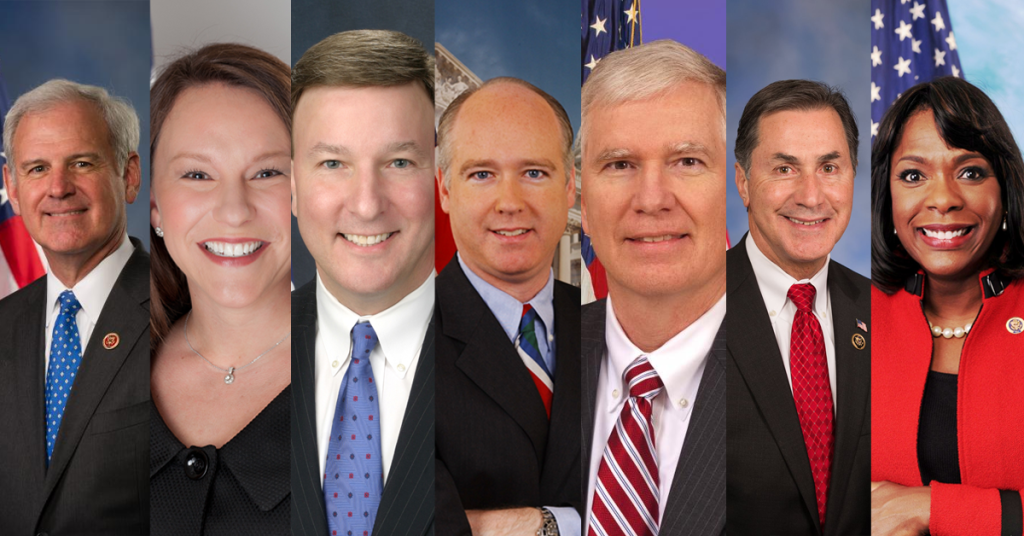GOP plays blame game while fighting to save House majority

Republicans have begun to concede defeat in the evolving fight to preserve the House majority. The party’s candidates may not go quietly, but from the Arizona mountains to suburban Denver to the cornfields of Iowa, the GOP’s most powerful players this midterm season are actively shifting resources away from vulnerable Republican House candidates deemed too far gone and toward those thought to have a better chance of political survival. And as they initiate a painful and strategic triage, the early Republican-on-Republican blame game has begun as well. GOP operatives connected to several vulnerable candidates complain that the committee responsible for electing House Republicans has failed to deliver on its promise to invest $62 million in political advertising across 11 states this fall, a promise detailed in a September memo that declared, “The cavalry is coming.” The operatives spoke on the condition of anonymity to avoid retribution; vulnerable Republican candidates still hope to receive additional financial support over the three weeks before Election Day. But if the cavalry is coming, it’s not coming for everyone. Already, the Republican operatives and spending patterns by both sides indicate GOP defeat in as many as a dozen House races — halfway to the number Democrats need to seize the House majority this fall. Dozens more seats are in play. “We’re starting to hone in on what are the races we can actually win. Sometime that requires a hard conversation,” said House Speaker Paul Ryan‘s fundraising chief, Spencer Zwick. Even after a burst of enthusiasm that helped Republican Senate candidates in several states following the recent Supreme Court debate, some Republicans closely following the more complicated House battlefield fear the party may have already lost Congress’ lower chamber. With 22 days to go, they’re working furiously in an expanding political battlefield to limit their losses. Fundraising challenges make it harder. As of Friday, the National Republican Congressional Committee has spent or reserved $44.8 million of television advertising in competitive House races since the end of July, according to spending records obtained by The Associated Press. That’s significantly less than the $62 million promised in last month’s memo. A committee spokesman explained it would meet the original spending projection by including polling and online advertising, which is more difficult to track. Meanwhile, the Republican committee is expected to take out a sizable loan to help meet its commitments. A separate memo, circulated to donors in recent days by the super PAC associated with Ryan, noted that it’s been forced to carry the bulk of this year’s financial burden given weak fundraising by the Republican candidates themselves. Of more than 30 races considered pure toss-ups, the memo states, Ryan’s super PAC is the sole spender in 14. “The GOP is now facing a green wave,” wrote Corry Bliss, who leads the group, known as the Congressional Leadership Fund. “Democratic candidates are outspending Republican candidates in key races by $50 million.” Indeed, Democratic candidates have outspent their Republican counterparts $116 million to $66 million across almost 80 competitive House districts since July, according to Friday’s spending records. The Congressional Leadership Fund has helped make up the difference, having invested $93 million over the same period, backed by massive donations from Republican mega-donor Sheldon Adelson. “This is going to be a devastating election for Republicans across the ballot,” said Republican strategist Terry Sullivan, who called the party’s fundraising issues a symptom of the GOP’s broader challenge this fall. “Republican donors are smart folks,” he said. “They’re not going to give money to a losing cause.” The Republican triage has been shaped by geography and demographics as much as by the candidates themselves. The GOP has a decent chance of preserving any House district that features a cornfield, pollsters and strategists say, pointing to less-educated rural voters who make up a significant portion of the Republican base. But where education and incomes are higher in suburban areas, Republicans are growing increasingly pessimistic. The NRCC in recent days has canceled plans to help at least three vulnerable Republican candidates: Rep. Kevin Yoder in suburban Kansas, Rep. Keith Rothfus in suburban Pittsburgh and businesswoman Lea Marquez Peterson in Tucson, Arizona. GOP strategists fear three open seats in the Pennsylvania suburbs and two more in suburban New Jersey are slipping away if they’re not lost already. And Republicans haven’t invested at all in a handful of other would-be competitive races, including Southern California’s open seat to replace retiring Republican Rep. Darrell Issa and the seat of Iowa Republican incumbent Rep. Rod Blum, whose district features the state’s northern suburbs and more than a dozen college campuses. Democrats canceled their advertising reserves in GOP Rep. Barbara Comstock‘s suburban Virginia district, a sign of confidence in light of public and private polling that gives the Republican incumbent little chance of winning. That’s despite the NRCC spending nearly $5 million in the district since July. At the same time, the Republican super PAC has shifted money away from at least two other vulnerable Republicans, including suburban Denver Rep. Mike Coffman and Michigan Rep. Steve Bishop. Yet Coffman spokesman Tyler Sandberg notes that Democratic groups ramped up their spending by more than $1 million over the last week, evidence that the race is “trending back in Coffman’s direction.” Bishop noted that the NRCC has invested more than $3 million in his race despite one super PAC’s recent decision to abandon the district. The Congressional Leadership Fund “has got lots of folks out there who really need help,” Bishop said. “I’m confident that their decision to do what they’ve done is a decision based on the fact that I’m well-covered here.” Bishop conceded that he’s been badly outspent by his opponents: “Michigan’s never seen this influx of money.” It’s not all bad news for Republicans. Polls suggest Republican prospects have improved in several GOP-leaning states where Democrats face re-election, silencing recent concerns that Democrats could take the Senate majority this fall as well. And several vulnerable House Republicans coming into the election year — a group that
Steve Flowers: a closer look at our current congressional delegation

There are dramatic differences between our congressional delegation of the 1940’s-1960’s and our group on the Potomac today. Obviously, their partisan badges have changed, as have Alabamians. There is also a tremendous difference in power and seniority of that era versus today’s group. That bygone era of Alabama congressmen were very progressive New Deal Democrats; whereas, our delegation today is one of the most conservative in America. Their paths to Congress were also very different. It was as though the earlier folks had been born to be in Congress. They all went to the University of Alabama for college and law school, went off to fight in the World War, came back to their hometown to practice law for a short while before going off to Congress for a 20-30 year tenure of “Going Along to Get Along.” Today’s delegation seems to have gotten there by accident. Of the seven, two went to Duke, one to Harvard, one to New York University, one to Birmingham Southern, one to Jacksonville State, and one to the University of Alabama. Six of the seven have law degrees, which is the only similarity to the bygone era. As we look toward next year’s election, let’s take a look at our current congressional delegates since all are on the ballot this year. Congressmen run every two years but seldom lose. Once you get to Washington the power of incumbency is tremendous. All of the Washington special interest money gravitates to incumbents. First district congressman, Bradley Bryne, is a Republican who was born and raised in Baldwin County in the heart of the traditional first district. This district is primarily a Baldwin and Mobile seat. Historically it has had great congressmen. Frank Boykin, Jack Edwards, Sonny Callahan, and Jo Bonner have more than aptly represented them over the past 80 years. Byrne is a lawyer by profession. He graduated from Duke undergraduate and University of Alabama Law School. He served five years in the Alabama State Senate before becoming chancellor of the State Community College System where he served several years. He ran for governor in 2010 and led the first primary, but lost to Robert Bentley in the runoff. He won a Special Election to Congress in December of 2013. He has taken to Congress like a duck to water. He is 62 and serves on the Armed Services and Rules Committees. He will win reelection to a third term this year. Second District Congresswoman, Martha Roby, is the only seat in play this year. She is vulnerable. Roby made a terrible mistake by saying that she was not going to vote for the Republican nominee, Donald Trump, last year. The backlash was dramatic. She is being challenged by three significant GOP opponents. Former Montgomery Mayor and Congressman, Bobby Bright, will be tough. State Representative, Barry Moore, of Enterprise chose to challenge Roby rather than seek reelection to the Legislature. He has been running against Roby for over a year. Rich Hobson is Roy Moore’s chief ally. He will be the heir apparent to Judge Moore’s Wiregrass organization. Bright, Moore and Hobson were all born and raised in the Wiregrass. Third district congressman, Mike Rogers, R-Anniston, is building some seniority and will be a safe bet for reelection. At the end of this term, he will have 16-years seniority. He serves on the Armed Services and Agriculture Committees where he is building power. The crown jewel of our congressional delegation is Robert Aderholt, R-Haleyville. Aderholt got to Congress at 30 years old and has 22 years of seniority. He is only 52 and is a ranking member of the Appropriations Committee. He will be reelected to a 12th term next year. Congressman Mo Brooks ran a very good race for the U.S. Senate last year. He will probably run again in 2020 against Democrat Doug Jones. He will be reelected to his Congressional seat this year, and get ready for another Senate run. Sixth district Birmingham Congressman, Gary Palmer, will win reelection to his suburban Jefferson/Shelby Republican seat. He is unopposed for a third term. Our only Democratic Congressperson is a Harvard educated lady. Terri Sewell is a lawyer, who had a successful law practice in Birmingham before being elected to Congress from the Seventh District eight years ago. The Selma native is on a fast track in Washington. She will go back for another two-year term. See you next week. ••• Steve Flowers is Alabama’s leading political columnist. His weekly column appears in over 60 Alabama newspapers. He served 16 years in the state legislature. Steve may be reached at www.steveflowers.us.
Bill Holtzclaw withdraws candidacy for U.S. Congress

Madison-Republican and state Sen. Bill Holtzclaw on Thursday announced he’s ending his campaign for U.S. Congress. Holtzclaw had announced his candidacy for Alabama 5th District in the U.S. House of Representatives against incumbent Rep. Mo Brooks in August. “As someone who has worn the uniform, as someone who has been in harms way in defense of our nation, I’m here to tell you: you send me to Washington and the men and women in uniform are going to have another champion in Congress,” he said announcing his candidacy. But the District 2 State Senator, who has represented portions of Madison and Limestone counties since 2010, said he will not seek re-election to his current seat. Instead, he is “ready to return to the private sector.” “After much consideration I have decided to end my campaign for Congress in the 5th Congressional District,” Holtzclaw announced on his blog. “Two weeks ago, I began my final legislative session as the State Senator for District 2. At times it has been ‘rough and tumble,’ but in the end it has been a rewarding 8 years serving as a member of the Alabama State Senate. I’m proud to have championed legislation for small businesses, veterans’ affairs and to combat driving under the influence, along with numerous issues that constituents brought to my attention. I am proud of the passage of such bills and the positive changes they have brought to the lives of everyday Alabamians.” He continued, “Thus after serving my country for 20 years as a US Marine, my state for 8 years as the Senator for AL District 2, and my city for 2 years as a Madison City Councilman; I am ready to return to the private sector. I am thankful to have had a good run and fought the good fight over 3 decades of public service. I will continue to serve in my role as a State Senator through the end of my term in November of this year. I look forward to spending more time with my family (including my second grandchild born over the holidays), working, and volunteering in my community.”


